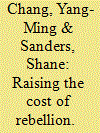| Srl | Item |
| 1 |
ID:
089492


|
|
|
|
|
| Publication |
2009.
|
| Summary/Abstract |
In this paper, terrorism is analysed using the tools of modern portfolio theory. This approach permits the analysis of the returns that a terrorist group can expect from their activities as well as the risk they face. The analysis sheds new light on the nature of the terrorist group's (attack method) choice set and the efficiency properties of that set. If terrorist groups are, on average, more risk averse, the economist can expect the terrorist group to exhibit a bias towards bombing and armed attack. In addition, even the riskiest (from the terrorist group's point of view) combinations of attack methods have maximum expected returns of less than 70 injuries and fatalities per attack per year.
|
|
|
|
|
|
|
|
|
|
|
|
|
|
|
|
| 2 |
ID:
089493


|
|
|
|
|
| Publication |
2009.
|
| Summary/Abstract |
Single-source, or non-competitive, defence procurement is a widespread phenomenon that is prevalent both in developing countries and in advanced arms exporting countries. The usual competitive bidding process - which assists in both value-for-money evaluation and in lowering corruption risk - is used much less often than expected in defence procurement. Whilst there can be good reasons for single sourcing, the opportunities and inducements for corruption are significantly escalated. Further, some countries that claim to employ single-source only in rare instances are found to have high percentages of non-competitive defence procurement. This is of particular concern as defence is perceived to be one of the more corruption-prone international business sectors, as identified in the 2002 Bribe Payers Index (Transparency International, 2002), with procurement presenting a significant source of corruption risk. The work presented here gives data on the percentage of defence single source procurement in a number of countries. Some countries were transparent and open about this data, even where it showed them in an unfavourable light. Most were not, citing sensitivity reasons or even that the data did not exist as reasons for refusal.
|
|
|
|
|
|
|
|
|
|
|
|
|
|
|
|
| 3 |
ID:
089495


|
|
|
|
|
| Publication |
2009.
|
| Summary/Abstract |
Retention is a crucial issue in the Armed Forces, especially in the all-volunteer Royal Navy. This is mainly due to a number of organisational challenges and changes in operational requirements and priorities. Naval manpower planners need to consider appropriate measures to improve retention in the service. The evidence gathered from the empirical investigation shows that external (pull) factors exert a significant effect on the early exit/quit rates from the RN. Key economic factors such as pay and employment opportunities in the civilian employment markets play an important role in the decisions that individual ratings make with regard to remaining in naval employment or leaving altogether. In particular, it was found that quit rates from the Navy are negatively associated with the claimant count (unemployment) rate (i.e. as the unemployment rate in the civilian economy increases, the early exit rate from the Navy decreases), whilst the overall increase in civilian wages bears a positive relationship on quitting behaviour. The analysis provides further evidence to support the need for policies that are tailor-made to cater for different ratings' specialisations within the Royal Navy.
|
|
|
|
|
|
|
|
|
|
|
|
|
|
|
|
| 4 |
ID:
089490


|
|
|
|
|
| Publication |
2009.
|
| Summary/Abstract |
To generate effective policy to reduce the proliferation of illicit small arms in developing countries, governments must understand how the weapons are distributed and illegal stockpiles formed. This paper describes the structural characteristics of small arms supply chains and models mechanisms delivering the weapons to illicit users. The paper draws on the experience of countries in Southeast Asia and the Pacific Melanesian states. By pointing to the structural complexity of small arms supply chains, it highlights challenges that multiple channels of supply pose for governments seeking to curb the flow of small arms into illicit stocks.
|
|
|
|
|
|
|
|
|
|
|
|
|
|
|
|
| 5 |
ID:
089496


|
|
|
|
|
| Publication |
2009.
|
| Summary/Abstract |
This paper presents a simple model to characterize explicitly the role that an intervening third party plays in raising the cost of rebellion in an intrastate conflict. Extending the Gershenson-Grossman (2000) framework of conflict in a two-stage game to the case involving outside intervention in a three-stage game as in Chang et al. (2007b), we examine the conditions under which an outside party optimally intervenes such that (i) the strength of the rebel group is diminished or (ii) the rebellion is deterred altogether. We also find conditions in which a third party optimally intervenes but at a level insufficient to deter rebellion. Such behavior, which improves the incumbent government's potential to succeed in conflict, is overlooked in some conflict studies evaluating the effectiveness of intervention. One policy implication of the model is that an increase in the strength of inter-governmental trade partnerships increases the likelihood that third-party intervention deters rebellion.
|
|
|
|
|
|
|
|
|
|
|
|
|
|
|
|